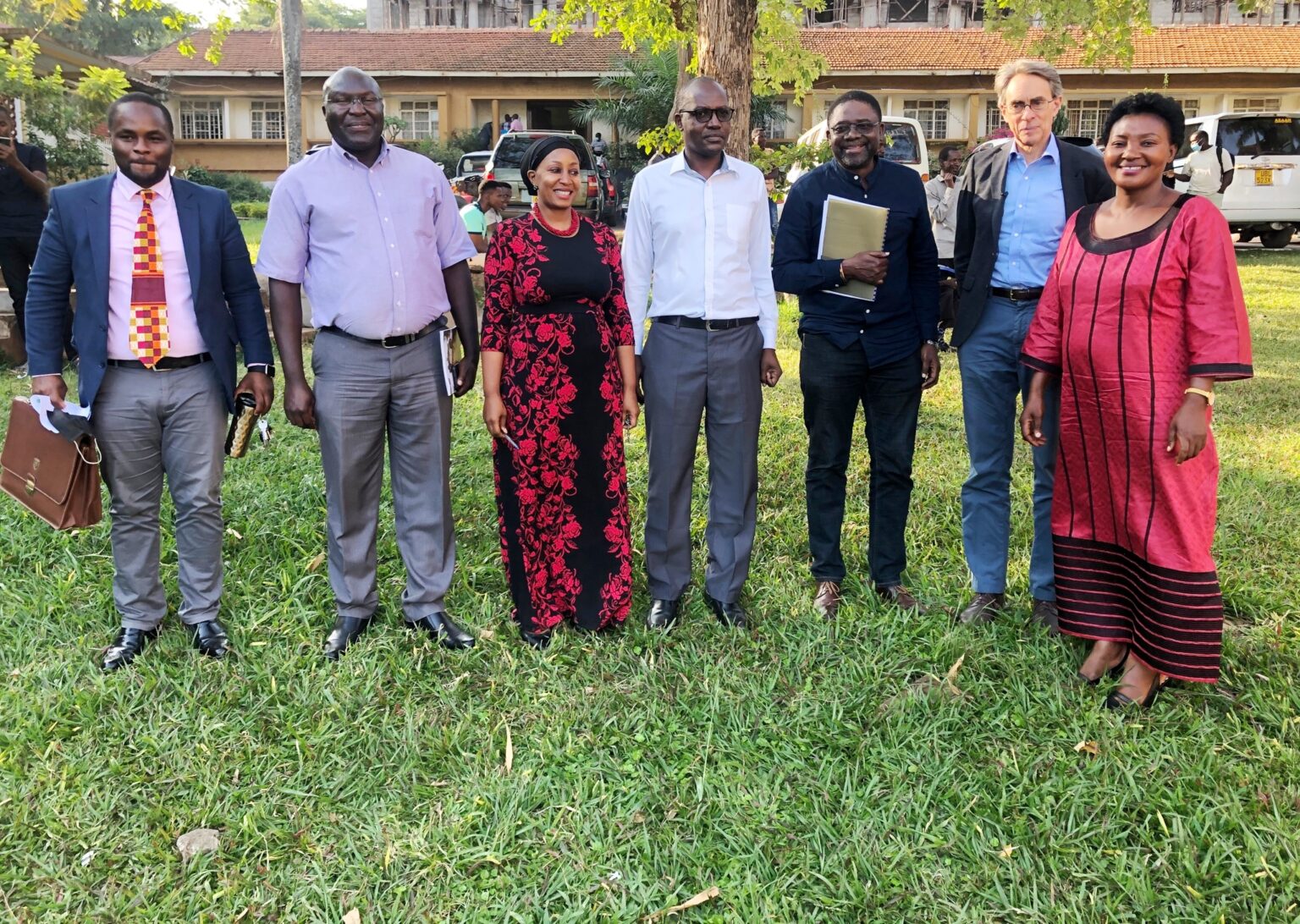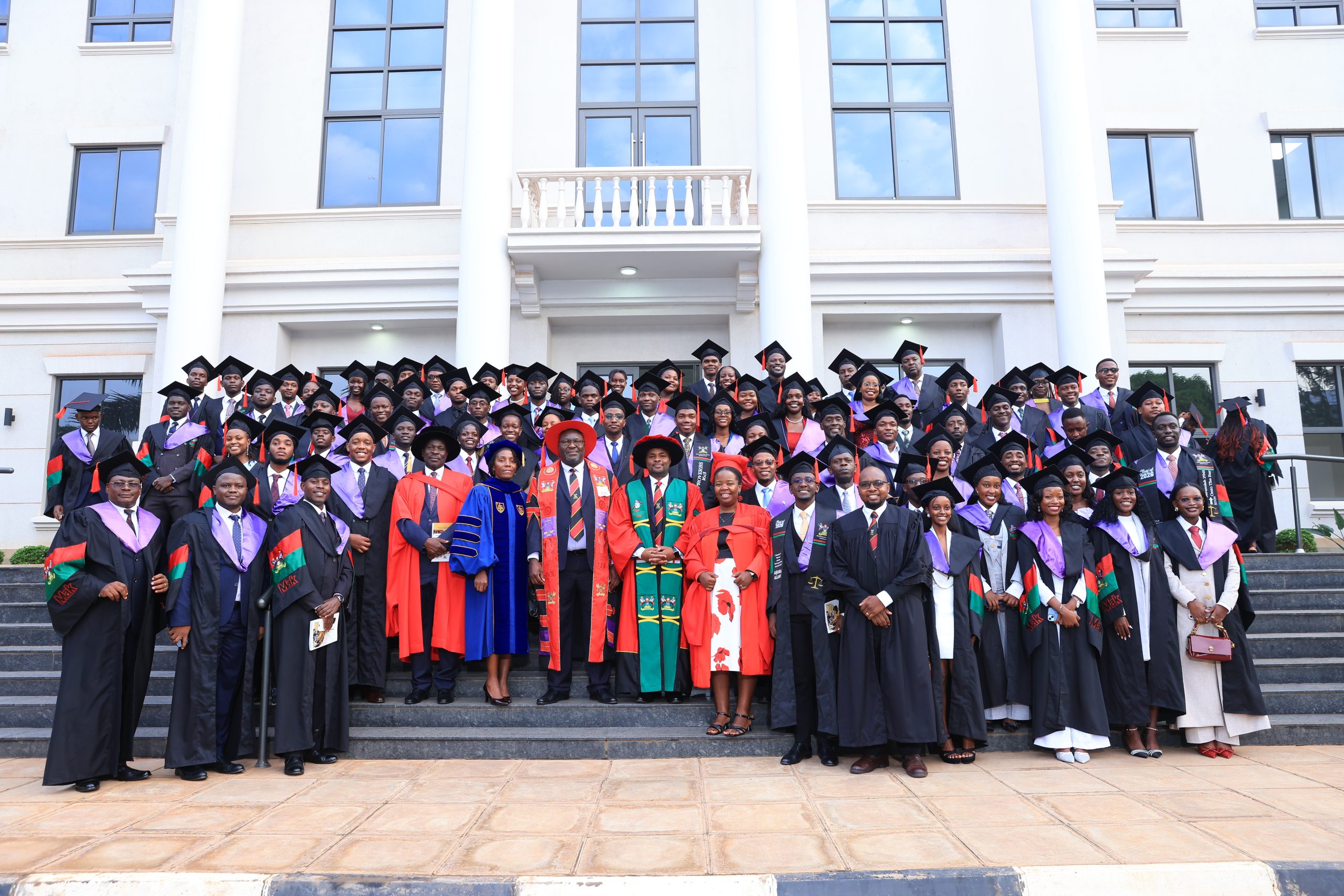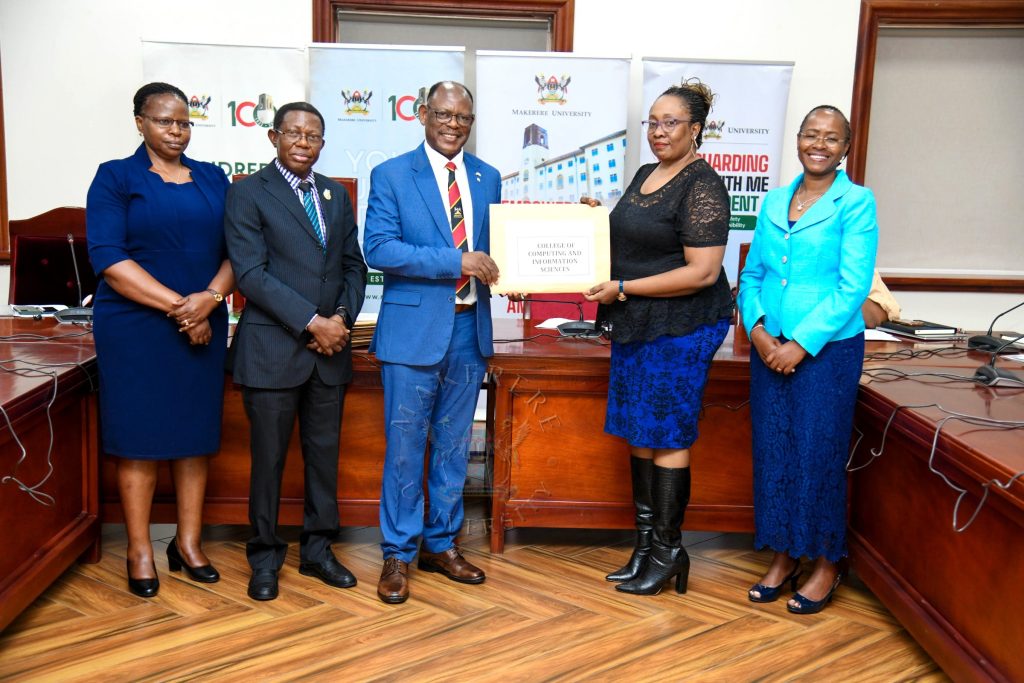HURIPEC Pledges to Continue Research and Documenting Human Rights Violations
The Human Rights and Peace Centre (HURIPEC) at Makerere University School of Law (SoL) has pledged to continue research on human rights and document its violations in Uganda. This pledge was given by Dr. Zahara Nampewo, Director – HURIPEC at a symposium jointly organised by HURIPEC and Human Rights Watch (HRW) held on the 30th June 2022 at Makerere University. The Symposium titled ‘Rule of Law and Barriers to Accountability for Unlawful Detentions: Challenges and Opportunities’ was attended by Diplomatic Corps, Civil Society representatives,Politicians, Government Officers, Academia, Researchers, Students and the general public.
The symposium was moderated by Professor Joe Oloka-Onyango, Faculty at the SoL. In his introductory remarks he quoted a report, ‘Uganda: The failure to safeguard human rights’ published by Amnesty International in 1992. The report examined the human rights record of the NRM government which had come to power in 1986 after gross human rights by previous governments. The report had concluded that ‘Despite some improvements regarding human rights, arbitrary arrest, illegal detention, torture (including rape) and summary executions by government forces continue to be reported and that the perpetrators are rarely brought to justice. Government critics, e.g. political leaders and newspaper editors, have been charged with offences such as sedition or treason, apparently for political reasons’. Professor Oloka-Onyango noted that 30 years later we are still discussing the question of unlawful detentions and human rights violations. He thanked HURIPEC and HRW for organising the event to allow participants to exchange views.

Professor Christopher Mbazira, Principal – SoL welcomed participants to the SoL and symposium. He thanked HURIPEC and HRW for organising the event noting that such partnerships proudly make SoL outstanding in the country, region and Africa continent.
Professor Mbazira added that ‘Uganda is currently defined as a country with repressed civic space where the population don’t share ideas freely’, He added, ‘Universities serve as civic spaces where people are able to share ideas. Makerere has many departments and colleges but its only SoL that provides civic space to promote human rights at the moment which I think is a mandate for academic institutions. I therefore urge and encourage other units to pick the baton’.
The Deputy Vice Chancellor – Academic Affairs, Professor Umar Kakumba represented Makerere University Management at the symposium. In his remarks, he warmly welcomed participants to Makerere University conveying greetings from management, particularly this centennial year when the institution is celebrating 100 years of existence. He reiterated the role of Makerere in transforming societies through its human capital and research output, adding that it is aligned to the reason we are convened here today to listen to work accomplished by HURIPEC, SoL and partners.

Professor Kakumba noted that Makerere’s history has been punctuated with upheavals linked to politics in Uganda. ‘The topic before us could not have been more timely now and even in the past. For many years after independence, Uganda saw a record of unlawful detentions and torture, many of which unfortunately ended in disappearances and death. Makerere was not spared losing our first Vice Chancellor, Frank Kalimuzo who reportedly was detained and killed on the orders of then President, Idi Amin Dada’. This marked the first attack on intellectualism and independent thinking in Uganda.
The Deputy Vice Chancellor highlighted that universities have a two-pronged role to play in human rights protection; first, human rights education which translates to public debate and opinions because of the autonomy as well as academic freedom of universities. Secondly, research output necessary for educating the next generation of policy and service providers, alongside objective evidence and reviews of current governmental policy. Professor Kakumba commended the School of Law in particular the Human Rights and Peace Centre for continuing to support the teaching of human rights law at Makerere. He further added that ‘as Makerere University, our strategic focus is to be a research-led institution, to provide relevant empirical data to the government and other key actors to guide the country’s policy and development agenda’.
Professor Kakumba explained that he hopes that the discussions here will trigger debate to shape policy on freedom from unlawful detentions.He wished the participants fruitful deliberations and thanked the School of Law, the HURIPEC team for always spearheading research on key legal, human rights and governance issues that always puts Makerere ahead of competitors. He assured the School of the support from University Management.

A keynote speech was delivered by Dr. Busingye Kabumba, Lecturer – SoL. His speech delved into the jurisprudence of liberty. Dr. Kabumba traced a history of documenting liberty quoting the US Declaration of Independence and French Constitution when the Monarchy was deposed. Coming closer to home, he explained that Article 23 of 2005 Uganda Constitution is about protection of personal liberty and a bill of rights is defined; however, while these are written the reality is different.
Dr. Kabumba Busingye added that its demoralizing that when colonialism ended and power handed over to African leaders, the leaders have been harsh. ‘Despite independence and declarations of liberty, the reality is hollow. Nationals are born in captivity and die in captivity in “open air prisons”’ he added. He highlighted laws that support unlawful detentions still in existence on the Uganda books of law like the Law of Idle and disorderly. In such instances, the arresting officer is the determinant of the wrong committed by the offender. Dr. Kabumba Busingye noted that because of unlawful detentions, prisons are full and more are required. He added that there are recent changes happening in the judicial system which will further affect civil liberties in Uganda for example high bail rates, appointment of acting judges among others.
‘Once you are in illegal detention, you are in no-man’s land, where anything can happen. We should be conscious of various forms of unlawful detentions’
‘There is a range of offenses targeting poor persons or political opponents; these are used to clean streets of undesirables. The person arresting you determines the offense’DR. BUSINGYE KABUMBA

Hon. Winfred Kiiza, former Leader of Opposition in Parliament; Dr. Zahara Nampewo, Director – HURIPEC and Mr. Kenneth Roth, Executive Director – Human Rights Watch constituted a Panel to discuss accountability for unlawful detentions by government institutions. Brigadier General Felix Kulayigye, spokesperson of the Uganda People’s Defence Forces (UPDF) had been invited and accepted to join the Panel but he was unable to attend the symposium.
Hon. Kiiza thanked SoL and HURIPEC for inviting her to attend and speak at the symposium, an opportunity for knowledge sharing. She re-echoed the first stanza of the Uganda National Anthem where one of the lyrics is ‘United, free for liberty together we’ll always stand’. She wondered whether Ugandans are actually free.
‘If Liberty and freedom were protected would we be here to discuss unlawful detentions’
‘Bad laws will eventually catch-up with every one, all people of conscience must rise up to defend the law and human rights. Even those pertetrating unlawful detentions are captives of they serve’
HON. WINFRED KIIZA
The Human Rights and Peace Centre (HURIPEC) at Makerere University School of Law (SoL) has pledged to continue research on human rights and document its violations in Uganda. This pledge was given by Dr. Zahara Nampewo, Director – HURIPEC at a symposium jointly organised by HURIPEC and Human Rights Watch (HRW) held on the 30th June 2022 at Makerere University. The Symposium titled ‘Rule of Law and Barriers to Accountability for Unlawful Detentions: Challenges and Opportunities’ was attended by Diplomatic Corps, Civil Society representatives,Politicians, Government Officers, Academia, Researchers, Students and the general public.
The symposium was moderated by Professor Joe Oloka-Onyango, Faculty at the SoL. In his introductory remarks he quoted a report, ‘Uganda: The failure to safeguard human rights’ published by Amnesty International in 1992. The report examined the human rights record of the NRM government which had come to power in 1986 after gross human rights by previous governments. The report had concluded that ‘Despite some improvements regarding human rights, arbitrary arrest, illegal detention, torture (including rape) and summary executions by government forces continue to be reported and that the perpetrators are rarely brought to justice. Government critics, e.g. political leaders and newspaper editors, have been charged with offences such as sedition or treason, apparently for political reasons’. Professor Oloka-Onyango noted that 30 years later we are still discussing the question of unlawful detentions and human rights violations. He thanked HURIPEC and HRW for organising the event to allow participants to exchange views.
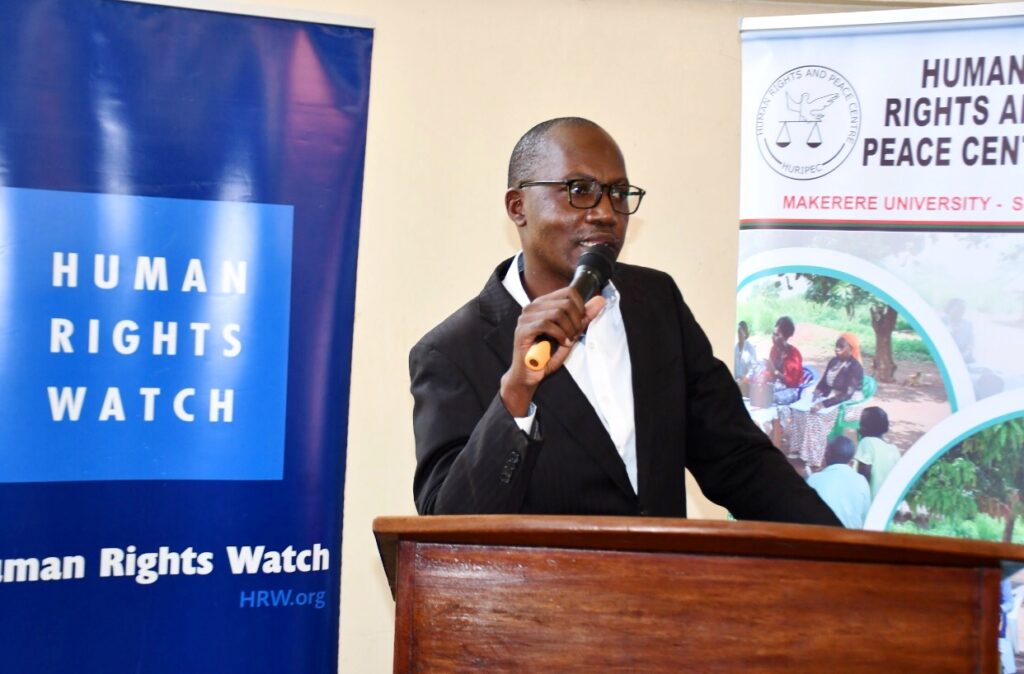
Professor Christopher Mbazira, Principal – SoL welcomed participants to the SoL and symposium. He thanked HURIPEC and HRW for organising the event noting that such partnerships proudly make SoL outstanding in the country, region and Africa continent.
Professor Mbazira added that ‘Uganda is currently defined as a country with repressed civic space where the population don’t share ideas freely’, He added, ‘Universities serve as civic spaces where people are able to share ideas. Makerere has many departments and colleges but its only SoL that provides civic space to promote human rights at the moment which I think is a mandate for academic institutions. I therefore urge and encourage other units to pick the baton’.
The Deputy Vice Chancellor – Academic Affairs, Professor Umar Kakumba represented Makerere University Management at the symposium. In his remarks, he warmly welcomed participants to Makerere University conveying greetings from management, particularly this centennial year when the institution is celebrating 100 years of existence. He reiterated the role of Makerere in transforming societies through its human capital and research output, adding that it is aligned to the reason we are convened here today to listen to work accomplished by HURIPEC, SoL and partners.
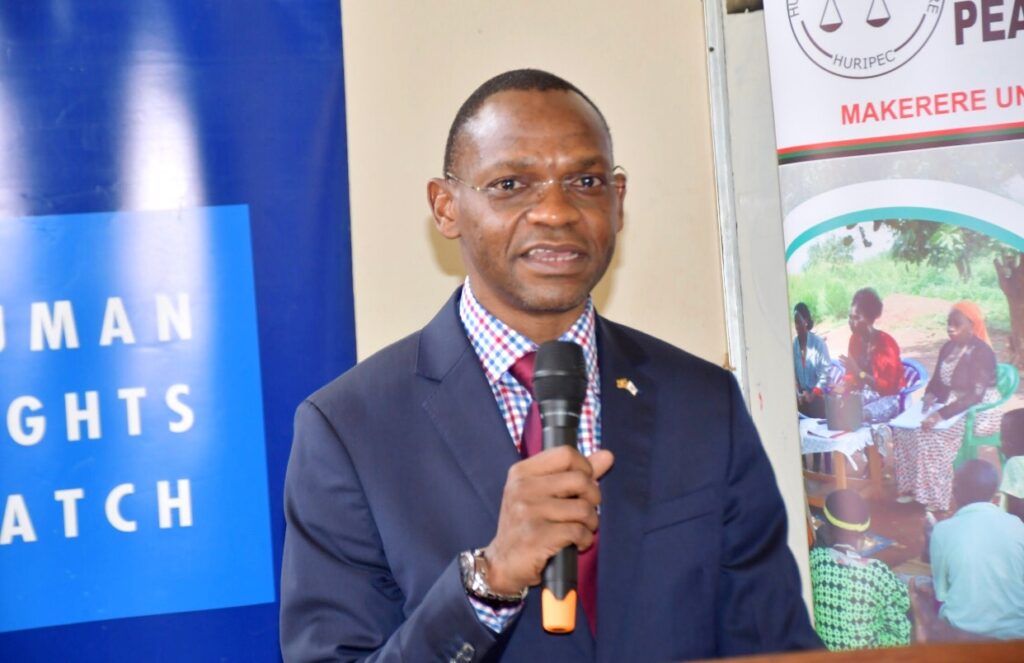
Professor Kakumba noted that Makerere’s history has been punctuated with upheavals linked to politics in Uganda. ‘The topic before us could not have been more timely now and even in the past. For many years after independence, Uganda saw a record of unlawful detentions and torture, many of which unfortunately ended in disappearances and death. Makerere was not spared losing our first Vice Chancellor, Frank Kalimuzo who reportedly was detained and killed on the orders of then President, Idi Amin Dada’. This marked the first attack on intellectualism and independent thinking in Uganda.
The Deputy Vice Chancellor highlighted that universities have a two-pronged role to play in human rights protection; first, human rights education which translates to public debate and opinions because of the autonomy as well as academic freedom of universities. Secondly, research output necessary for educating the next generation of policy and service providers, alongside objective evidence and reviews of current governmental policy. Professor Kakumba commended the School of Law in particular the Human Rights and Peace Centre for continuing to support the teaching of human rights law at Makerere. He further added that ‘as Makerere University, our strategic focus is to be a research-led institution, to provide relevant empirical data to the government and other key actors to guide the country’s policy and development agenda’.
Professor Kakumba explained that he hopes that the discussions here will trigger debate to shape policy on freedom from unlawful detentions.He wished the participants fruitful deliberations and thanked the School of Law, the HURIPEC team for always spearheading research on key legal, human rights and governance issues that always puts Makerere ahead of competitors. He assured the School of the support from University Management.
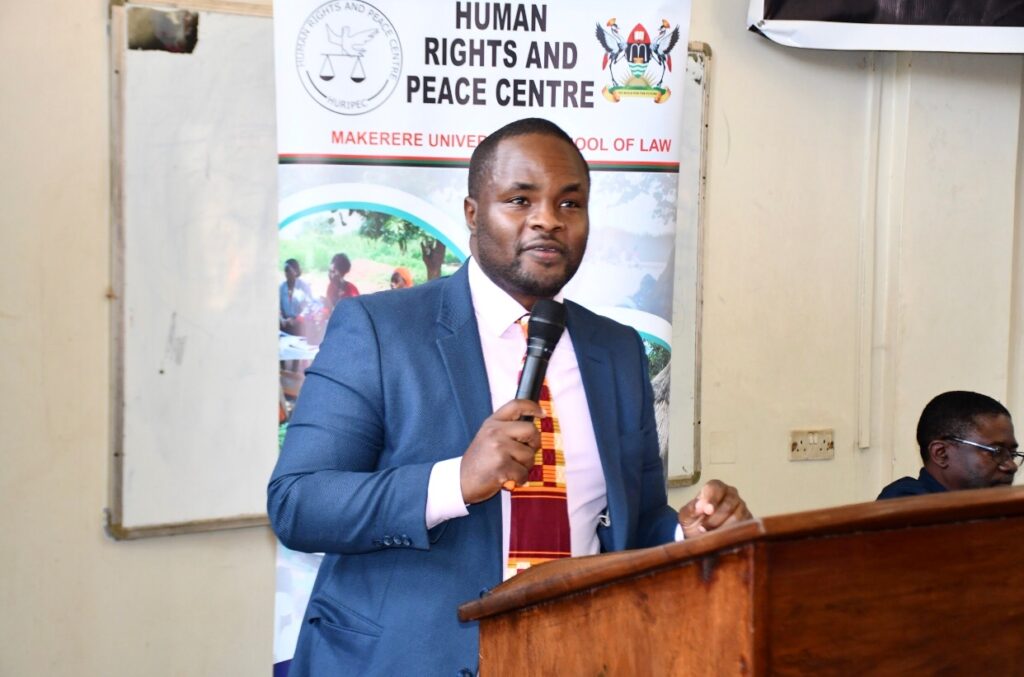
A keynote speech was delivered by Dr. Busingye Kabumba, Lecturer – SoL. His speech delved into the jurisprudence of liberty. Dr. Kabumba traced a history of documenting liberty quoting the US Declaration of Independence and French Constitution when the Monarchy was deposed. Coming closer to home, he explained that Article 23 of 2005 Uganda Constitution is about protection of personal liberty and a bill of rights is defined; however, while these are written the reality is different.
Dr. Kabumba Busingye added that its demoralizing that when colonialism ended and power handed over to African leaders, the leaders have been harsh. ‘Despite independence and declarations of liberty, the reality is hollow. Nationals are born in captivity and die in captivity in “open air prisons”’ he added. He highlighted laws that support unlawful detentions still in existence on the Uganda books of law like the Law of Idle and disorderly. In such instances, the arresting officer is the determinant of the wrong committed by the offender. Dr. Kabumba Busingye noted that because of unlawful detentions, prisons are full and more are required. He added that there are recent changes happening in the judicial system which will further affect civil liberties in Uganda for example high bail rates, appointment of acting judges among others.
‘Once you are in illegal detention, you are in no-man’s land, where anything can happen. We should be conscious of various forms of unlawful detentions’
‘There is a range of offenses targeting poor persons or political opponents; these are used to clean streets of undesirables. The person arresting you determines the offense’
DR. BUSINGYE KABUMBA
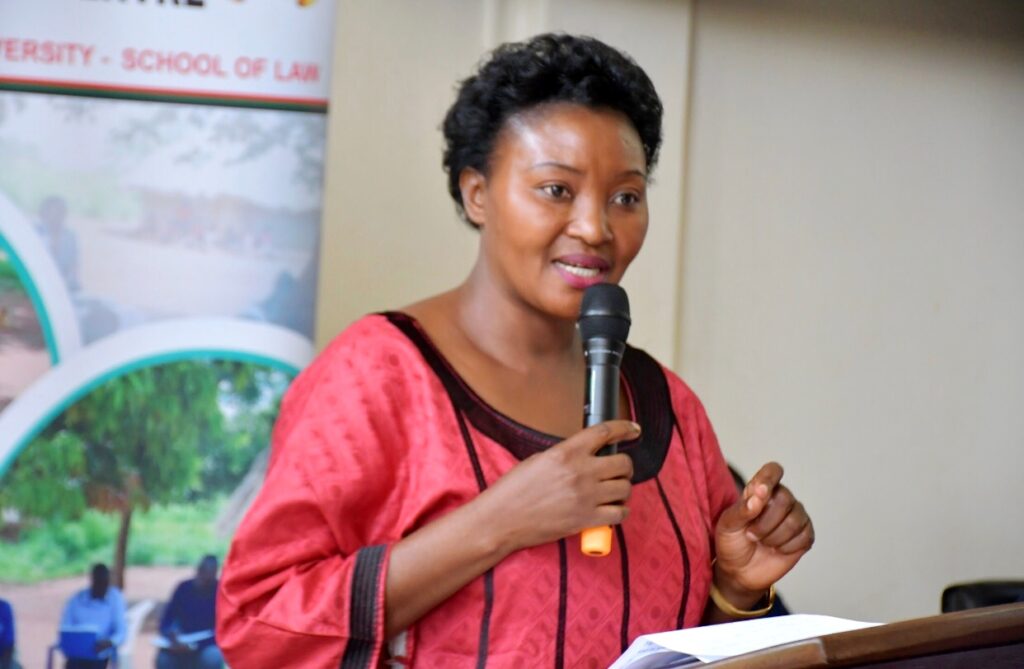
Hon. Winfred Kiiza, former Leader of Opposition in Parliament; Dr. Zahara Nampewo, Director – HURIPEC and Mr. Kenneth Roth, Executive Director – Human Rights Watch constituted a Panel to discuss accountability for unlawful detentions by government institutions. Brigadier General Felix Kulayigye, spokesperson of the Uganda People’s Defence Forces (UPDF) had been invited and accepted to join the Panel but he was unable to attend the symposium.
Hon. Kiiza thanked SoL and HURIPEC for inviting her to attend and speak at the symposium, an opportunity for knowledge sharing. She re-echoed the first stanza of the Uganda National Anthem where one of the lyrics is ‘United, free for liberty together we’ll always stand’. She wondered whether Ugandans are actually free.
‘If liberty and freedoms were protected would we be here to discuss unlawful detentions’
‘Bad laws will eventually catch-up with everyone, all people of conscience must rise up to defend the law and human rights. Even those perpetrating unlawful detentions are captives of they serve’
HON. WINFRED KIIZA
Hon. Kiiza stated, ‘everyone is expected to follow the law where the expectation is thatthe law is fair, but is it’. She thanked SoL and HURIPEC for organising the discussions because it has become so difficult to share knowledge. She called for accountability of leaders at all levels adding that we are in a situation of ‘rule by law not rule of law’.

Many issues are interconnected with unlawful detentions but ‘Ugandans have a tendency of normalizing situations, consider the rising prices of fuel (diesel is more expensive than petrol which was unseen before)’, Dr. Zahara Nampewo highlighted. She added that previously, there was a presidential acknowledgment of unlawful detentions where he said, ‘security agencies were arresting perpetrators of terrorism and insecurity, talk of unlawful detentions should be ignored because that can’t happen under the government of National Resistance Movement (NRM)’. Dr. Nampewo also shared summary of the report, ‘Human Rights Violations in Uganda: The Abuse of Civil and Political Rights in the Era of Kisanja Hakuna Mchezo’. The report was produced by HURIPEC to audit observance of human rights in the era of ‘Kisanja Hakuna Mchezo’, President Museveni’s term 2016-2021. The research findings concluded that violations of political and civil rights continued to occur in the term. Some of the violations highlighted included: excessive use of force by security agencies leading to injuries and deaths, detention beyond 48 hours, disappearances to unknown detention places, extra-judicial killings, torture and degrading treatment.
‘Strongman syndrome exists in Uganda where officers posture themselves to be above the law. The strongman syndrome has enabled powerrful individuals to issue orders even in contravention of the law. These strongmen are able to use the system for their personal interests
Dr. Zahara Nampewo

Mr. Kenneth Roth shared what transpired in a meeting that HRW had held with His Excellency, President Yoweri Kaguta Museveni to share their report on the status of Unlawful Detention and Abuse in Unauthorized Places of Detention in Uganda titled, ‘I Only Need Justice’. Issues discussed included Human Rights Protection Act; holding government accountable;proposed human rights defenders law; persecution of civil society in Uganda through the changes instituted in the NGO law;attacks on press members; Facebook shut down among others. The President promised to review the issues raised.
‘The issue of unlawful detentions takes both a criminal and political dimension especially with Internal Security Organisation (ISO). People were picked up and disappeared. There were also reports of people beaten, raped and tortured with them being extorted for release’.
– MR. KENNETH ROTH
A number of issues were raised during discussions:
- The four ‘I’s affecting human rights in Uganda were given as: Impunity by security and government personnel;Institutions and their collapse; Information and documentation of human rights violations as evidence for future reference and Implementation of laws and guidelines.
- The role of the international community in holding the government accountable for violations.
- Resilience and response mechanisms by the population.
- The appointment of NRM cadres as judicial officers and in human rights institutions which affects objectivity and impartiality required in justice.
- Partnerships are required in fighting human rights violations, no one or institution can solve the problem alone. Consider development of a strategic plan to bring all parties on table to work together.
- Ugandans are suffering from collective Post Traumatic Stress Disorder (PTSD) due to the abuse and violations suffered. The end might be very bad for the country.
- Vicious cycle of abuse of state power from colonial time to subsequent governments in Uganda since independence.
- Torture, fear and intimidation affecting population, media and others players in the country.
- HURIPEC has to organize other meetings like the symposium to continue sharing knowledge on human rights violations and unlawful detentions.
- The civic space in Uganda continues to narrow and hopefully academic institutions can help close the gap.
The organisers of the symposium, HURIPEC and HRW promised to share a detailed report of the meeting.
The symposium was closed by Professor Christopher Mbazira, Principal SoL. He thanked HURIPEC and HRW for organising the Symposium. He also thanked the audience assuring participants that SoL will continue to be a safe civic space.
‘The culture of impunity has become more entrenched; Courts are mobbed not to grant bail or make certain decisions, people holding public offices are mobbed to grant favours, inconsistent with procedures of the law’
PROFESSOR CHRISTOPHER MBAZIRA

